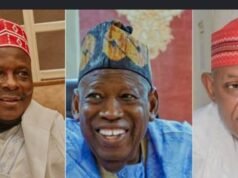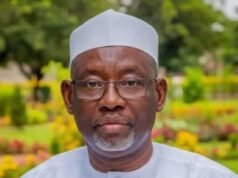Babayola M. Toungo
President Bola Tinubu’s declaration in Brazil asserting that Nigeria is “free from corruption” is not merely aspirational – it is a deliberate attempt at narrative engineering. Such a statement, made on an international stage, does not just invite scrutiny; it demands it. To suggest Nigeria is free from corruption, against the backdrop of persistent systemic rot, is not only misleading but also erodes the credibility of any genuine reform efforts. This article seeks to delve beyond surface-level criticisms, interrogating the motivations, implications, and deeper realities such a pronouncement exposes about leadership, governance, and public trust in Nigeria.
Unlike a naive or overly optimistic assertion, President Tinubu’s declaration appears calculated – a strategic move intended to manipulate both international perception and domestic discourse. By projecting an image of a corruption-free nation, the president attempts to recast Nigeria’s global reputation, perhaps to attract investment or curry favour with foreign partners. However, this deliberate reframing is not benign; it disregards the daily experiences of ordinary Nigerians who navigate a landscape rife with systemic graft. The absence of any clarification or retraction by the presidency further underscores the intentionality behind the message, suggesting a conscious effort to redefine reality by fiat.
Corruption in Nigeria is not incidental – it is structural and deeply woven into the fabric of both state and society. The machinery of government, from federal ministries down to local agencies, is frequently compromised by opaque processes, patronage networks, and conflicts of interest. These are not isolated incidents; they are symptomatic of a broader culture where access to power translates into opportunities for personal enrichment and impunity. The president’s statement, therefore, is not just a denial of corruption but an erasure of the lived realities of millions who encounter bribery, extortion, and favouritism as everyday obstacles.
The entrenchment of corruption is further exacerbated by elite capture – the phenomenon where political and economic power rests in the hands of a small, interconnected group. Appointments to key government positions, the awarding of contracts, and the allocation of national resources are often shaped by personal loyalty, financial inducements, and familial ties rather than merit or integrity. Specific cases wherein companies linked to the president’s family secure lucrative government projects highlight the depth of these entanglements. Such practices not only violate ethical norms but also institutionalise a system of patronage that perpetuates inequality and undermines public trust in governance.
Leadership is performative – the signals sent from the top cascade through the ranks of government and society. President Tinubu’s body language, choice of associates, and track record – marked by allegations of tolerating questionable conduct – send a clear message about the standards that prevail in his administration. When the highest office in the land appears to shield or excuse corrupt behaviour, it normalises a culture of impunity. This is not a matter of perception alone – it is a matter of consequence, as leadership sets the tone for what is permissible or punishable within the polity.
Beyond high-level scandals, the rot extends to routine interactions with public institutions. The expectation of facilitation fees, bribes, or “returns” before contracts are awarded or services rendered has become almost institutionalised. Heads of Ministries, Departments, and Agencies (MDAs) accused of demanding upfront payments from contractors exemplify how corruption is embedded in processes meant to serve the public interest. The cumulative effect is a hollowing out of institutions, where public service is subverted for private gain, and the most vulnerable bear the brunt through poor infrastructure, inadequate healthcare, and dysfunctional education systems.
A president’s refusal to acknowledge the existence and scale of corruption is more than a strategic miscalculation – it is a betrayal of the social contract. Such denial deepens public cynicism, alienates citizens from the state, and signals to would-be reformers that their efforts are unwelcome. Without honest engagement with the problem, there can be no meaningful reform. The consequences are not abstract – inefficiency, insecurity, and underdevelopment are the tangible outcomes of a governance system that refuses to confront its own failings.
The Economic and Financial Crimes Commission (EFCC) has increasingly been wielded as an instrument to further the president’s political agenda, raising concerns about the erosion of democratic pluralism. Opposition figures often find themselves vigorously pursued by the EFCC, yet investigations and charges seem to dissipate once these individuals align themselves with the ruling party. This pattern suggests that anti-corruption efforts are selectively enforced, serving less as a genuine mechanism for accountability and more as a tool to consolidate power and silence dissent.
While the desire to project a positive image of Nigeria internationally is understandable, the means of doing so matter. Glossing over fundamental challenges in favour of empty declarations undermines Nigeria’s credibility on the world stage. Investors, development partners, and foreign governments are not oblivious to the realities on the ground – they base decisions on data, reports, and lived experiences. Thus, a narrative that denies corruption not only fails to convince but may also backfire, casting doubt on the sincerity and competence of national leadership.
The path to a truly “corruption-free” Nigeria cannot be paved with misleading statements or denial. It requires courageous leadership willing to confront uncomfortable truths, transparent institutions built on accountability, and an engaged citizenry that demands better. President Tinubu’s statement, far from being a harmless aspiration, is a deliberate misrepresentation that risks entrenching the very problems it purports to deny. Real progress will only come when leaders acknowledge the depth of the challenge and commit to reforms that put the public good above personal or political interests. Anything less is not just inadequate – it is dangerous.










